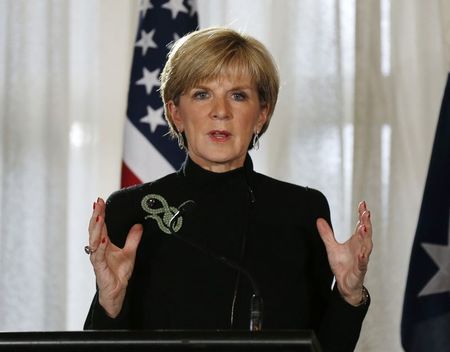SYDNEY (Reuters) - Australia and Indonesia have agreed to resume intelligence and military cooperation, officials from both countries said on Tuesday, ending a rift that erupted late last year over Australian spying.
Australian Foreign Minister Julie Bishop and Prime Minister Tony Abbott will travel to Indonesia to sign the new "Joint Understanding of a Code of Conduct" with Indonesian Foreign Minister Marty Natalegawa and Indonesia's outgoing President Susilo Bambang Yudhoyono, Australian media said.
"We have reached agreement on the joint understanding and we are currently arranging a time to sign it," Bishop told the Australian Broadcasting Corp., without giving further details.
Australia's Department of Foreign Affairs and Trade did not respond immediately to a request for further comment.
Teuku Faizasyah, Indonesia's presidential spokesman for international affairs, said the document would allow Australia and Indonesia to resume military cooperation.
The often tetchy relations between the two neighbors struck a new low in November over media revelations that Australia had spied on Yudhoyono, his wife and other top Indonesian officials.
"We are talking about a commitment to build trust after the taping incident and the code of conduct is the answer," Faizasyah told Reuters. "We will have to evaluate its implementation."
Ties have been strained further over the issue of asylum seekers who attempt to sail to Australia via Indonesia.
Abbott implemented a policy, which has been condemned by Jakarta, of towing back to Indonesia often leaky vessels carrying asylum seekers.
Indonesia suspended military and police cooperation with Australia over asylum seekers. In December, Yudhoyono presented a six-point plan for restoring good relations, including a code of conduct on intelligence matters.

The Australian newspaper reported that Yudhoyono had reviewed the new code and that it includes a promise by Australia not to use its spy agencies to harm its neighbor.
(Reporting By Jane Wardell in SYDNEY and Kanupriya Kapoor in JAKARTA; Editing by Kim Coghill and Paul Tait)
